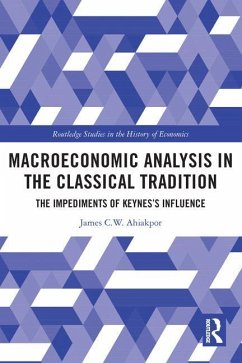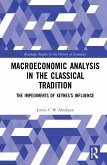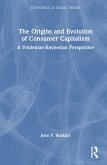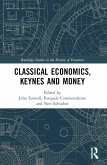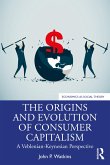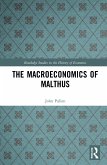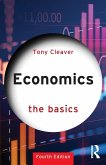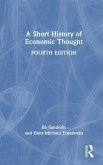James C W Ahiakpor
Macroeconomic Analysis in the Classical Tradition
The Impediments Of Keynes's Influence
James C W Ahiakpor
Macroeconomic Analysis in the Classical Tradition
The Impediments Of Keynes's Influence
- Broschiertes Buch
- Merkliste
- Auf die Merkliste
- Bewerten Bewerten
- Teilen
- Produkt teilen
- Produkterinnerung
- Produkterinnerung
Macroeconomic Analysis in the Classical Tradition explains how the influence of Keynesà â â s macroeconomics, including his changed definitions of some key macroeconomic concepts, has impeded many analystsà â â ability to readily resolve disputes in modern macroeconomics.
Andere Kunden interessierten sich auch für
![Macroeconomic Analysis in the Classical Tradition Macroeconomic Analysis in the Classical Tradition]() James C W AhiakporMacroeconomic Analysis in the Classical Tradition123,99 €
James C W AhiakporMacroeconomic Analysis in the Classical Tradition123,99 €![The Origins and Evolution of Consumer Capitalism The Origins and Evolution of Consumer Capitalism]() John P. WatkinsThe Origins and Evolution of Consumer Capitalism178,99 €
John P. WatkinsThe Origins and Evolution of Consumer Capitalism178,99 €![Classical Economics, Keynes and Money Classical Economics, Keynes and Money]() Classical Economics, Keynes and Money65,99 €
Classical Economics, Keynes and Money65,99 €![The Origins and Evolution of Consumer Capitalism The Origins and Evolution of Consumer Capitalism]() John P. WatkinsThe Origins and Evolution of Consumer Capitalism29,99 €
John P. WatkinsThe Origins and Evolution of Consumer Capitalism29,99 €![The Macroeconomics of Malthus The Macroeconomics of Malthus]() John PullenThe Macroeconomics of Malthus35,99 €
John PullenThe Macroeconomics of Malthus35,99 €![Economics Economics]() Tony CleaverEconomics18,99 €
Tony CleaverEconomics18,99 €![A Short History of Economic Thought A Short History of Economic Thought]() Bo SandelinA Short History of Economic Thought79,99 €
Bo SandelinA Short History of Economic Thought79,99 €-
-
-
Macroeconomic Analysis in the Classical Tradition explains how the influence of Keynesà â â s macroeconomics, including his changed definitions of some key macroeconomic concepts, has impeded many analystsà â â ability to readily resolve disputes in modern macroeconomics.
Hinweis: Dieser Artikel kann nur an eine deutsche Lieferadresse ausgeliefert werden.
Hinweis: Dieser Artikel kann nur an eine deutsche Lieferadresse ausgeliefert werden.
Produktdetails
- Produktdetails
- Routledge Studies in the History of Economics
- Verlag: Taylor & Francis Ltd
- Seitenzahl: 254
- Erscheinungstermin: 26. September 2022
- Englisch
- Abmessung: 234mm x 156mm x 14mm
- Gewicht: 400g
- ISBN-13: 9780367721930
- ISBN-10: 0367721937
- Artikelnr.: 65609127
- Herstellerkennzeichnung
- Books on Demand GmbH
- In de Tarpen 42
- 22848 Norderstedt
- info@bod.de
- 040 53433511
- Routledge Studies in the History of Economics
- Verlag: Taylor & Francis Ltd
- Seitenzahl: 254
- Erscheinungstermin: 26. September 2022
- Englisch
- Abmessung: 234mm x 156mm x 14mm
- Gewicht: 400g
- ISBN-13: 9780367721930
- ISBN-10: 0367721937
- Artikelnr.: 65609127
- Herstellerkennzeichnung
- Books on Demand GmbH
- In de Tarpen 42
- 22848 Norderstedt
- info@bod.de
- 040 53433511
James C. W. Ahiakpor is Emeritus Professor of Economics at California State University East Bay, Hayward, USA.
(1) Introduction: The Pervasive Impediment of Keynes's Influence in Modern
Macroeconomic Analysis (2) Interpreting Say's Law of Markets or Outlets
Correctly: The Impediments of Keynes's Influence (3) Could Keynes have made
a Legitimate Case against John Stuart Mill's Statement of the Law of
Markets? An Illustration of Keynes's Abiding Influence (4) Saving and the
Relevant Ricardian Equivalence Theorem (5) Milton Friedman's Permanent
Income Hypothesis: A Distraction from Keynes's Misrepresentation of Saving
as Non-spending (6) The Classical Heritage of Monetary Theory and Policy at
Chicago and Harvard before the Keynesian Conquest (7) 100% Money: A Harmful
Proposal Appropriately Ignored (8) Keynes's Liquidity Trap is Impossible:
Classical Monetary Analysis Helps to Explain (9) The Classical Roots of the
Phillips Curve Analysis (10) The Future of Keynesian Economics: Struggling
to Sustain a Dimming Light (11) Conclusion: Some Policy Implications of
Ridding Macroeconomics of Keynes's Influence
Macroeconomic Analysis (2) Interpreting Say's Law of Markets or Outlets
Correctly: The Impediments of Keynes's Influence (3) Could Keynes have made
a Legitimate Case against John Stuart Mill's Statement of the Law of
Markets? An Illustration of Keynes's Abiding Influence (4) Saving and the
Relevant Ricardian Equivalence Theorem (5) Milton Friedman's Permanent
Income Hypothesis: A Distraction from Keynes's Misrepresentation of Saving
as Non-spending (6) The Classical Heritage of Monetary Theory and Policy at
Chicago and Harvard before the Keynesian Conquest (7) 100% Money: A Harmful
Proposal Appropriately Ignored (8) Keynes's Liquidity Trap is Impossible:
Classical Monetary Analysis Helps to Explain (9) The Classical Roots of the
Phillips Curve Analysis (10) The Future of Keynesian Economics: Struggling
to Sustain a Dimming Light (11) Conclusion: Some Policy Implications of
Ridding Macroeconomics of Keynes's Influence
(1) Introduction: The Pervasive Impediment of Keynes's Influence in Modern Macroeconomic Analysis (2) Interpreting Say's Law of Markets or Outlets Correctly: The Impediments of Keynes's Influence (3) Could Keynes have made a Legitimate Case against John Stuart Mill's Statement of the Law of Markets? An Illustration of Keynes's Abiding Influence (4) Saving and the Relevant Ricardian Equivalence Theorem (5) Milton Friedman's Permanent Income Hypothesis: A Distraction from Keynes's Misrepresentation of Saving as Non-spending (6) The Classical Heritage of Monetary Theory and Policy at Chicago and Harvard before the Keynesian Conquest (7) 100% Money: A Harmful Proposal Appropriately Ignored (8) Keynes's Liquidity Trap is Impossible: Classical Monetary Analysis Helps to Explain (9) The Classical Roots of the Phillips Curve Analysis (10) The Future of Keynesian Economics: Struggling to Sustain a Dimming Light (11) Conclusion: Some Policy Implications of Ridding Macroeconomics of Keynes's Influence
(1) Introduction: The Pervasive Impediment of Keynes's Influence in Modern
Macroeconomic Analysis (2) Interpreting Say's Law of Markets or Outlets
Correctly: The Impediments of Keynes's Influence (3) Could Keynes have made
a Legitimate Case against John Stuart Mill's Statement of the Law of
Markets? An Illustration of Keynes's Abiding Influence (4) Saving and the
Relevant Ricardian Equivalence Theorem (5) Milton Friedman's Permanent
Income Hypothesis: A Distraction from Keynes's Misrepresentation of Saving
as Non-spending (6) The Classical Heritage of Monetary Theory and Policy at
Chicago and Harvard before the Keynesian Conquest (7) 100% Money: A Harmful
Proposal Appropriately Ignored (8) Keynes's Liquidity Trap is Impossible:
Classical Monetary Analysis Helps to Explain (9) The Classical Roots of the
Phillips Curve Analysis (10) The Future of Keynesian Economics: Struggling
to Sustain a Dimming Light (11) Conclusion: Some Policy Implications of
Ridding Macroeconomics of Keynes's Influence
Macroeconomic Analysis (2) Interpreting Say's Law of Markets or Outlets
Correctly: The Impediments of Keynes's Influence (3) Could Keynes have made
a Legitimate Case against John Stuart Mill's Statement of the Law of
Markets? An Illustration of Keynes's Abiding Influence (4) Saving and the
Relevant Ricardian Equivalence Theorem (5) Milton Friedman's Permanent
Income Hypothesis: A Distraction from Keynes's Misrepresentation of Saving
as Non-spending (6) The Classical Heritage of Monetary Theory and Policy at
Chicago and Harvard before the Keynesian Conquest (7) 100% Money: A Harmful
Proposal Appropriately Ignored (8) Keynes's Liquidity Trap is Impossible:
Classical Monetary Analysis Helps to Explain (9) The Classical Roots of the
Phillips Curve Analysis (10) The Future of Keynesian Economics: Struggling
to Sustain a Dimming Light (11) Conclusion: Some Policy Implications of
Ridding Macroeconomics of Keynes's Influence
(1) Introduction: The Pervasive Impediment of Keynes's Influence in Modern Macroeconomic Analysis (2) Interpreting Say's Law of Markets or Outlets Correctly: The Impediments of Keynes's Influence (3) Could Keynes have made a Legitimate Case against John Stuart Mill's Statement of the Law of Markets? An Illustration of Keynes's Abiding Influence (4) Saving and the Relevant Ricardian Equivalence Theorem (5) Milton Friedman's Permanent Income Hypothesis: A Distraction from Keynes's Misrepresentation of Saving as Non-spending (6) The Classical Heritage of Monetary Theory and Policy at Chicago and Harvard before the Keynesian Conquest (7) 100% Money: A Harmful Proposal Appropriately Ignored (8) Keynes's Liquidity Trap is Impossible: Classical Monetary Analysis Helps to Explain (9) The Classical Roots of the Phillips Curve Analysis (10) The Future of Keynesian Economics: Struggling to Sustain a Dimming Light (11) Conclusion: Some Policy Implications of Ridding Macroeconomics of Keynes's Influence

